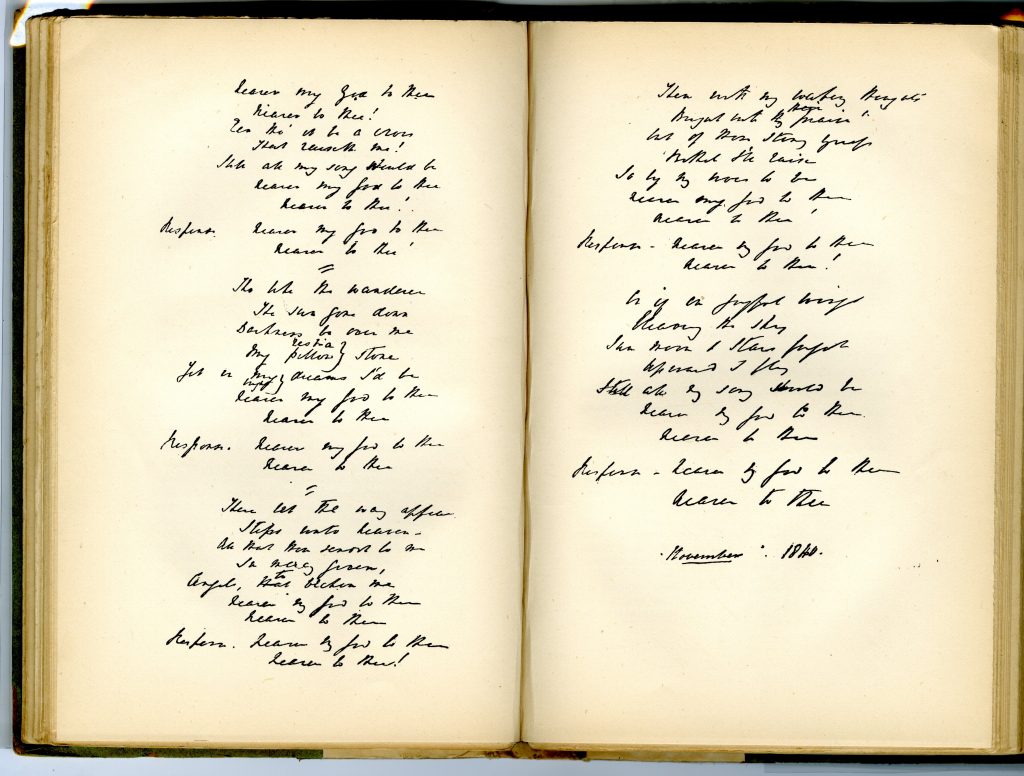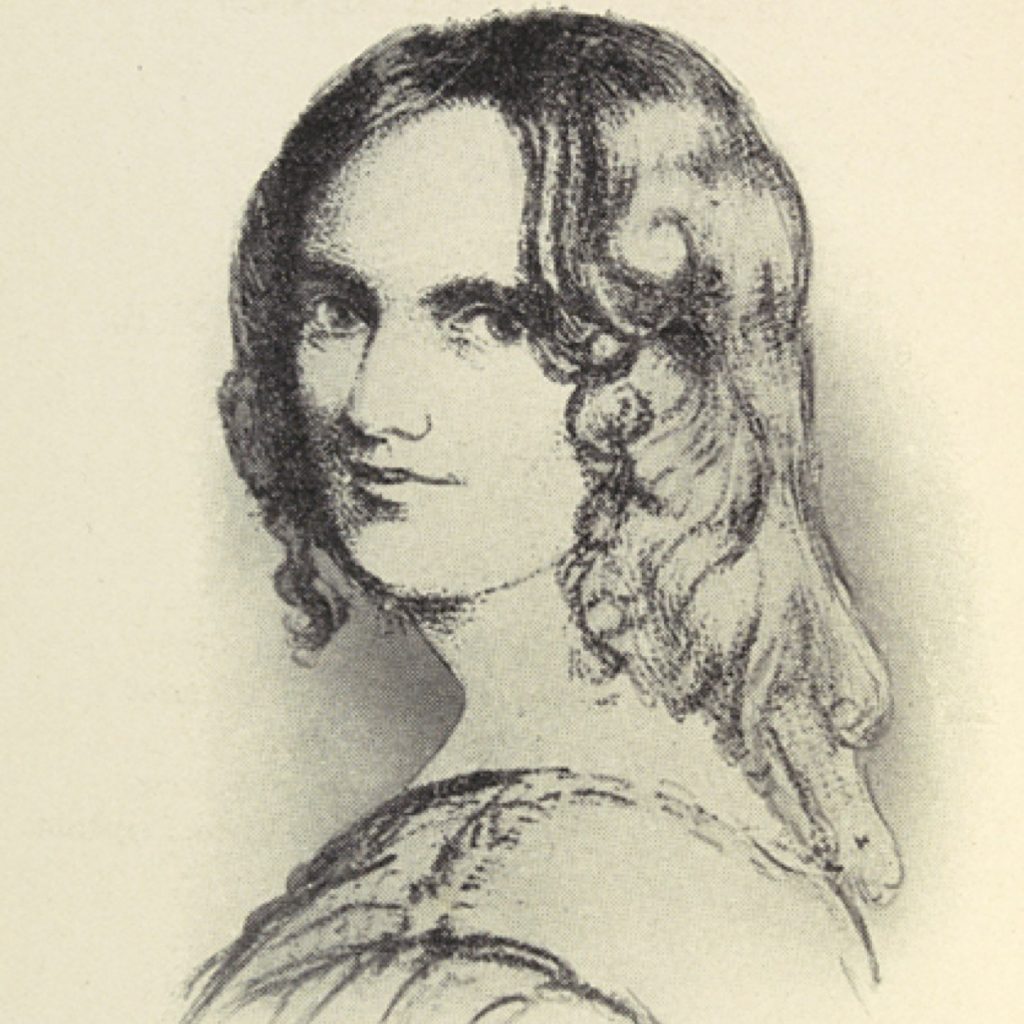By Melinda Creech
Graduate Assistant, Armstrong Browning Library
The Oceanic Steam Navigation Company, more commonly known as the White Star Line, was a prominent British shipping company. Founded in 1845, The White Star Line, operated a fleet of clipper ships that sailed between Britain, Australia, and America. The ill-fated Titanic was perhaps their most famous ship. The Armstrong Browning Library has a few connections to the Titanic. One connection relates to a set of postcards that disappeared with the Titanic and another relates to the author of the hymn, “Nearer, My God, to Thee,” the song that was purportedly playing as the Titanic sank. The Armstrong Browning Library’s collection includes a letter with the White Star logo in its heading and several letters written on board ships or while individuals were preparing to board ships. The letters, written between 1841 and 1912, are lines from people who were passengers on SS (Steamer Ships), RMS (Royal Mail Steamers), or HMS (Her Majesty’s Ship). It is interesting to note that one of the first purposes of steamers crossing the Atlantic was to deliver the mail. These lines, written from steamer ships, may shed some light on the adventure and danger presented by steamer travel in the late nineteenth century.
This post, although not directly related to the steamers, draws a connection between the author of “Nearer My God to Thee,” the song reported to have been played on the sinking Titanic, and the Armstrong Browning Library’s collection.
It was purported by several passengers, including Mrs. Vera Gillespie Dick (1894-1973), that “Nearer my God to Thee” was the song that the band was playing as the Titanic sank. Able to board a lifeboat, Mrs. Dick later reported
Even in Canada, where we have such clear nights . . . I have never seen such a clear sky. The stars were very bright and we could see the Titanic plainly, like a great hotel on the water. Floor after floor of the lights went out as we watched. It was horrible, horrible. I can’t bear to think about it. From the distance , as we rowed away, we could hear the band playing ‘Nearer , My God To Thee.’
Logan, 238
The bandleader on the Titanic, Wallace Hartley (1879-1912), was reported to have said to a friend that if he were on a sinking ship, “Nearer, My God, to Thee” would be one of the songs he would play (Barczewski, Stephanie. Titanic: A Night Remembered. Bloomsbury Academic, 2006, 132). There are, of course, arguments against the “Near my God to Thee” story, and it is likely that the tune, which might have been either Horbury or Propior Deo, was not the one that we recognize today, written my Lewis Carey.
However, the words, based on the story of Jacob’s dream in Genesis 28:11–12, were written by Sarah Flower Adams in November of 1840

Sarah Flower Adams.”Nearer My God To Thee” from Conway, Moncure Daniel. Centenary History of the South Place Society:Based on Four Discourses given in the Chapel in May and June, 1893. London, 1894.
and first published in Hymns and Anthems by W. J. Fox, 1841. Sarah Flower Adam had eleven hymns published in the book, and “Nearer My God to Thee” is No. 85.

“Nearer My God to Thee” in Hymns and Anthems by W. J. Fox, 1841. Courtesy of the New York Public Library.
Robert Browning was a childhood friend of Sarah and her sister Eliza. They often discussed religion. Robert Browning writes in a letter to Eliza, Sarah’s sister, circa 1841, that “all this music I shall be so thoroughly gratified to hear,” referring to the Hymns and Anthems. Robert Browning himself had a hymn in the book, No. 146, based on his poem Paracelsus:
I stoop
into a dark tremendous sea of cloud,
It is but for a time ; I press God’s lamp
Close to my breast ; its splendour, soon or late,
Will pierce the gloom : I shall emerge one day
The Armstrong Browning Library has a letter written by Sarah Flower when she was twenty-two years old and Robert Browning was fourteen.
The very large letter written on one sheet of paper begins: “What in the name of fortune is the girl going to do with this tremendous sheet of paper?” She then proceeds to fill the entire sheet with words, front and back. In the letter Sarah says: “I wonder what I am to be when I go into that other state, —whatever it is? I have often fixed on a bird, a blossom, a star, it all depends on my mood—.” This resonates with the words she later wrote in her hymn, “Nearer, My God, to Thee”—
Or if on joyful wing, cleaving the sky,
Sun, moon, and stars forgot, upwards I fly,
This letter is important to the Armstrong Browning Library, because it also contains Sarah’s transcript of two of Robert Browning’s earliest poems.
Sources:
Marshall, Logan. The Tragic Story of the Empress of Ireland: An Authentic Account of the Most Horrible Disaster in Canadian History Constructed from the Real Facts Obtained from Those on Board Who Survived and Other Great Sea Disasters. John C. Winston Company, 1914.
Conway, Moncure Daniel. Centenary History of the South Place Society:Based on Four Discourses given in the Chapel in May and June, 1893. London, 1894.






